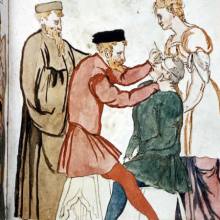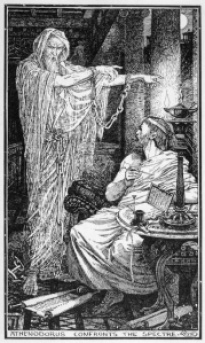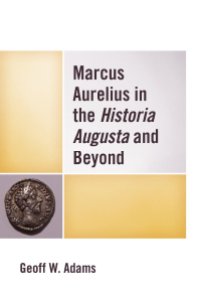[Excerpt on the Stoic Paradoxes from Teach Yourself Stoicism by Donald Robertson.]
Although Stoicism was a philosophical system that prized rational understanding, the original philosophical arguments of Zeno were notoriously terse and unconvincing to his critics. Zeno proclaimed many famous “paradoxes”, which literally meant ideas that go against what the majority believe, flying in the face of popular opinion. They portrayed a radical but impressively coherent world-view that attracted many people who wanted to see if it could be defended more rigorously.
The third head of the Stoic School, Chrysippus, one of the very greatest intellectuals of the ancient world, attempted to do this, writing hundreds of volumes of detailed philosophical arguments in defence of Stoic doctrine, particularly engaging with the criticisms made by ancient Skeptics who represented a rival school, the Academy of Plato. He basically transformed Stoicism from the small movement founded by Zeno into one of the philosophical heavyweights of the ancient world.
For if Chrysippus had not lived and taught,
The Stoic school would surely have been naught. (Lives, 7.183)
We’re told he was known for making the striking remark to his teacher Cleanthes that he only wanted to be instructed in the core doctrines (dogmata) of Stoicism and that he would discover the arguments for and against them for himself (Lives, 7.179).
Many modern readers will likewise first be attracted to the attention-grabbing ideas of the Stoics, which promise to turn our prevailing philosophy of life on its head, and then seek to weigh them up rationally later. Some Stoics even referred to this upheaval in our world-view and system of values, turning away from the conventional view of the majority, as a philosophical “conversion” (epistrophê), literally a “turning around” or “U-turn” in life. In this regard, the Stoics were influenced by the Cynics, who we’re told would walk against the flow of the crowds leaving a theatre, or walk about backwards in public, to illustrate their desire to swim against the current in life and go in the opposite direction from the majority of people (Lives, 6.64; Anthology, 3.4). The Stoics therefore recognised that they were saying things many people would struggle to accept at first, although they also believed that their philosophy was ultimately based on common sense assumptions, accessible to everyone on reflection.
For example, Cicero defends six notoriously cryptic “Stoic Paradoxes” in his short book of that title:
- Virtue, or moral excellence, is the only good (conventional “goods” such as health, wealth and reputation fundamentally count as nothing with regard to living a good life)
- Virtue is completely sufficient for Happiness and fulfilment, a man who is virtuous lacks no requirement of the good life
- All forms of virtue are equal as are all forms of vice (in terms of the benefit or harm they do to the individual himself)
- Everyone who lacks perfect wisdom is insane (which basically means everyone alive; we’re all essentially mad)
- Only the wise man is really free and everyone else is enslaved (even when the wise man is imprisoned by a tyrant or sentenced to death like Socrates, he is still freer than everyone else, including his oppressors)
- Only the wise man is truly rich (even if, like Diogenes the Cynic, he owns nothing that he can’t carry in his knapsack)
These puzzles require some explaining, as we’ll see. Musonius Rufus apparently used to say that students were expected to be left in stunned silence following his lectures rather than applauding him. They felt that they’d heard something unnerving but powerful and were often unsure what to make of it all at first. I’d say that this is true for modern readers as well. If we don’t feel at least slightly unsettled by what the Stoics are saying then we’re probably missing something. Yet despite the paradoxes, Stoicism was in many respects the most down-to-earth of the Athenian philosophical schools, being grounded in our experience of daily life. We’re told Cleanthes, the second head of the Stoa, used to remark: “Possibly the philosophers say what is contrary to opinion [or “paradoxical”], but assuredly not what is contrary to reason” (Epictetus, Discourses, 4.1).



 The Stoic philosopher
The Stoic philosopher  Here are some principles derived from ancient Stoic literature, and adapted slightly to serve as a set of basic guidelines for the attitude and actions of those wishing to engage in online communities, in accord with Stoic wisdom and virtue. Please help me to improve them by suggesting changes or additions in the comments below, and I’ll try to revise them accordingly.
Here are some principles derived from ancient Stoic literature, and adapted slightly to serve as a set of basic guidelines for the attitude and actions of those wishing to engage in online communities, in accord with Stoic wisdom and virtue. Please help me to improve them by suggesting changes or additions in the comments below, and I’ll try to revise them accordingly.